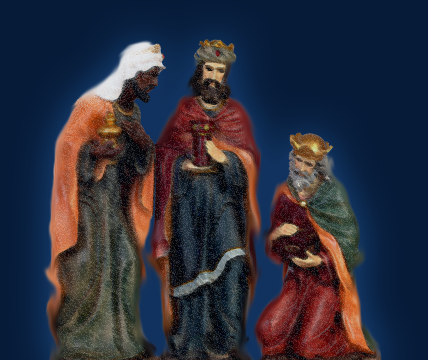The Wise Men
“Now, when Jesus was born in Bethlehem of Judaea, in the days of Herod the king, behold, there came wise men from the East to Jerusalem, saying: “Where’s he that is born King of the Jews? For we have seen his star in the east, and are come to worship him”.
Matthew 2: 1-2
(…) “And lo, the star, which they saw in the east, went before them, till it came and stood over where the young child was.”
Matthew 2:9
Thus is described in the Gospel of Matthew (and only in his) the visit of the Magi to baby Jesus, having been guided from Persia to Bethlehem by a mysterious star shining in the sky even in daylight. Two mysteries arise from Matthew’s account: who were these wise men? And what star would be that of Bethlehem? As for the wise men, historians say that they were the successors of the wise Chaldeans of Babylon, famous for their divination predicates, their wisdom and their great astronomical knowledge. At the time of Christ’s birth, it was likely that the Magi were astrological counselors of the kingdom of Parthia, also in ancient Persia, presently Iran, adherents of Zoroastrianism, one of the first monotheistic religions and who were also known as “fire worshippers”.
Marco Polo’s
account of the Magi

Marco Polo, the greatest traveler of all time, made an interesting account about the wise men. He reports in his travel book that when he passed through the city of Sava (presently Saveh, in Iran), from where the wise men would have left, he was taken by the inhabitants to visit the tomb of the wise men where, incredulous, he found that the bodies were intact, as well as their beards and hair.
Marco Polo’s account of the Magi
Marco Polo, the greatest traveler of all time, made an interesting account about the wise men. He reports in his travel book that when he passed through the city of Sava (presently Saveh, in Iran), from where the wise men would have left, he was taken by the inhabitants to visit the tomb of the wise men where, incredulous, he found that the bodies were intact, as well as their beards and hair.

Questioning the inhabitants of the city, Marco Polo learned that the three kings, upon arriving at the place of the birth of the boy, decided to enter alone, one at a time.
The youngest was the first to enter and soon returned stunned, because what he had seen was someone similar to himself both in age and clothing.
When the second, middle-aged, wise man entered the grotto, he found the same thing, that is, someone like him. In the turn of the elder occurred the same as with those who preceded him. The three decided to enter together and then found the boy of the size and age corresponding to his three days of birth.
They then prostrated themselves before Him offering Him gold, incense and myrrh. The wise men had said that if only the gold was accepted, the boy would be an earthly king; if it were only incense, he would be a god and if he took only myrrh, then he would be a mage. As the boy accepted the three gifts, the visitors concluded that it was God, a terrestrial king and a mage.

On leaving, they also received a gift: a small safe that was only opened when they returned to their homeland. And then they found only a simple stone. The wise men knew that there ought to be a hidden meaning to that stone, but as they did not reach a conclusion, they decided to throw it into a well. That done, an intense fire descended from the heavens and penetrated the well. Thus the mages understood that they should not have disposed of the stone that had magical powers. They also understood the meaning of what the stone had told them: to be firm and constant in their faith. Then the mages took the fire that came out of the well and carried it to their respective kingdoms and when that fire was about to extinguish, they returned to the well to supply themselves with the sacred fire that burned infinitely.
Que estrela seria aquela de Belém? Um meteoro ou meteorito? Um cometa? Um cometa ou uma supernova?

The origin of Christmas
In Rome, the first reference to Natale Domini (Christmas of the Lord) dates back to the year 336.


